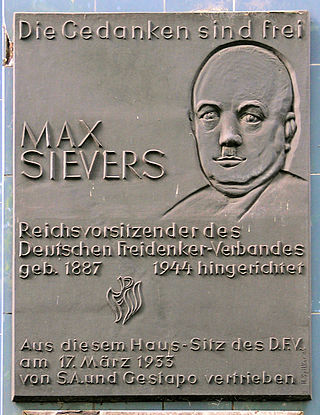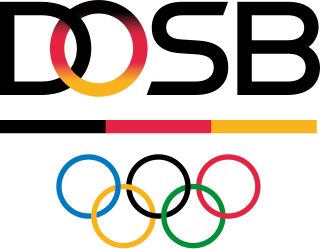Related Research Articles

Der Stahlhelm, Bund der Frontsoldaten, commonly known as Der Stahlhelm, was a German First World War veteran's organisation existing from 1918 to 1935. In the late days of the Weimar Republic, it was closely affiliated to the monarchist German National People's Party (DNVP), placed at party gatherings in the position of armed security guards.

Freethought is an unorthodox attitude or belief.

The German Football Association is the governing body of football, futsal, and beach soccer in Germany. A founding member of both FIFA and UEFA, the DFB has jurisdiction for the German football league system and is in charge of the men's and women's national teams. The DFB headquarters are in Frankfurt am Main. Sole members of the DFB are the German Football League, organising the professional Bundesliga and the 2. Bundesliga, along with five regional and 21 state associations, organising the semi-professional and amateur levels. The 21 state associations of the DFB have a combined number of more than 25,000 clubs with more than 6.8 million members, making the DFB the single largest sports federation in the world.

The DDR-Oberliga was the top-level association football league in East Germany.

The East Germany national football team, recognised as Germany DR by FIFA, represented East Germany in men's international football, playing as one of three post-war German teams, along with Saarland and West Germany.
In the fourteen years the Weimar Republic was in existence, some forty parties were represented in the Reichstag. This fragmentation of political power was in part due to the use of a peculiar proportional representation electoral system that encouraged regional or small special interest parties and in part due to the many challenges facing the nascent German democracy in this period.

The Secular Coalition for America is an advocacy group located in Washington D.C. It describes itself as "protecting the equal rights of nonreligious Americans."

Max Georg Wilhelm Sievers was chairman of the German Freethinkers League, writer and active communist, later social democrat.

The European Humanist Federation, officially abbreviated as EHF-FHE, was an umbrella of more than 60 humanist and secularist organisations from 25 European countries.

The German Olympic Sports Confederation was founded on 20 May 2006 by a merger of the Deutscher Sportbund (DSB), and the Nationales Olympisches Komitee für Deutschland (NOK) which dates back to 1895, the year it was founded and recognized as NOC by the IOC.
NSTG Asch was an ethnically-German football club from what was known as the town of Asch, Sudetenland and is today Aš, Czech Republic. The team played a single incomplete season in the regional top-flight Gauliga Sudetenland.

Irreligion is prevalent in Germany. In a time of near-universal adoption of Christianity, Germany was an intellectual centre for European freethought and humanist thinking, whose ideas spread across Europe and the world in the Age of Enlightenment. Later, religious traditions in Germany were weakened by the twin onslaughts of Nazi rule during World War II and that of the Socialist Unity Party in East Germany during the Cold War. In common with most other European societies, a period of secularisation also continued in the decades that followed. While today Christianity remains prevalent in the west of Germany, in the east relatively few Germans identify with any religion whatsoever.

The Northern German Football Association is one of the five regional associations of the German Football Association and covers the four German states of Bremen, Hamburg, Lower Saxony and Schleswig-Holstein.

The Western German Football Association is one of the five regional associations of the German Football Association and covers German state of North Rhine-Westphalia.

The Humanistischer Verband Deutschlands is an organisation to promote and spread a secular humanist worldview and an advocate for the rights of nonreligious people. It was founded 1993 in Berlin and counts about 20,000 members. The HVD is a member of the International Humanist and Ethical Union and the European Humanist Federation.

The German Metal Workers' Union was a German industrial union for metalworkers formed in 1891 and dissolved after the Nazis' accession to power in 1933.
Vrijdenkersvereniging De Vrije Gedachte (DVG) (English: Freethinkers association The Free Thought), is a Dutch atheist–humanist association of freethinkers. It was founded in 1856 and known by the name De Dageraad ("The Dawn") before assuming its present name in 1957. De Vrije Gedachte strives to use reason, natural science and logic to liberate humanity from prejudices, clerical paternalism, dogmas and false truths.
The Freethinkers Association of Switzerland (FAS) is a Swiss nonprofit organisation for freethought. It is the result of the merger of several late 19th century and early 20th century local freethinkers associations throughout Switzerland into a national society, currently headquartered in Bern.
The German Tobacco Workers' Union was a trade union representing people in the tobacco manufacturing industry in Germany.
References
- 1 2 Hanne May (2006). Religiosität in der säkularisierten Welt. VS Verlag fnr Sozialw. ISBN 3-8100-4039-8.
- 1 2 "Der verlängerte Arm einer herrschenden Partei - Vor 15 Jahren wurden die DDR-Freidenker gegründet". Evangelische Zentralstelle für Weltanschauungsfragen - Materialdienst…. 2015-09-16. Archived from the original on 2015-09-16.
- 1 2 Royle, Edward (1980). Radicals, Secularists, and republicans: popular freethought in Britain, 1866-1915. Manchester: Manchester University Press. p. 78. ISBN 0-7190-0783-6.
- 1 2 "Atheist Hall Converted: Berlin Churches Establish Bureau to Win Back Worshipers". The New York Times. May 14, 1933. p. 2. Retrieved September 18, 2010.
- ↑ Geschichte, freidenker.org